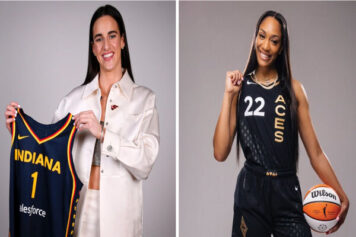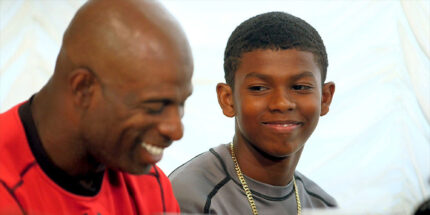There has been so much conversation about Kamala Harris’ race over the last year, her ethnic identity has become a sore spot for many potential voters. Her mother, Shyamala Gopalan Harris, was East Indian and so that makes the Democratic vice-presidential candidate of South Asian descent. She, for all practical purposes, is Asian. Her father, Donald Harris, is Jamaican, which makes her Afrodiasporic.
Her acceptance speech on Wednesday night at the Democratic National Convention and all of the nuances that she dropped on the audience gathered to witness this historic moment live or via television, makes her Black. Blackity Black.
17 minutes in length, she started off giving honor to the ancestors … #ASÉ
“I am here tonight is a testament to the dedication of generations before me. Women and men who believed so fiercely in the promise of equality, liberty, and justice for all.”
She, then, acknowledged the work of women who moved against great odds to open the political gates for her, Barack Obama and Hillary Clinton to walk through.
“This week marks the 100th anniversary of the passage of the 19th amendment. And we celebrate the women who fought for that right. Yet so many of the Black women who helped secure that victory were still prohibited from voting, long after its ratification. But they were undeterred.”
The women she highlighted were all not just HBCU attendees and staunch suffrage activists but also members of Delta Sigma Theta Sorority, Inc.
“And these women inspired us to pick up the torch, and fight on. Women like Mary Church Terrell and Mary McCleod Bethune. Fannie Lou Hamer and Diane Nash. Constance Baker Motley and Shirley Chisholm. We’re not often taught their stories. But as Americans, we all stand on their shoulders.”
Like any good Black woman, she acknowledges her mother.
“There’s another woman, whose name isn’t known, whose story isn’t shared. Another woman whose shoulders I stand on. And that’s my mother — Shyamala Gopalan Harris.”
During her speech, she made mention that she was at the Civil Rights marches of the 60s.
“They fell in love in that most American way — while marching together for justice in the civil rights movement of the 1960s. In the streets of Oakland and Berkeley, I got a stroller’s-eye view of people getting into what the great John Lewis called ‘good trouble.’”
She shouted out her man, who happens to be white, her family (both biological and extended) that spans many different hues and complexions, hair textures, and body types.
“Family, is my husband Doug, who I met on a blind date set up by my best friend. Family is our beautiful children, Cole and Ella, who as you just heard, call me Momala. Family is my sister. Family is my best friend, my nieces, and my godchildren. Family is my uncles, my aunts, and my chithis. Family is Mrs. Shelton — my second mother who lived two doors down and helped raise me.”
Harris shouted her sorority, the Divine 9, and her HBCU. She is a graduate of Howard University, which is considered the Mecca for Black Greek sororities. AKAs and the sisters of Delta Sigma Theta were founded on the Washington D.C. school’s campus at Miner Hall.
“Family is my beloved Alpha Kappa Alpha … our Divine 9 … and my H.B.C.U. brothers and sisters.”
As she moved to her close, she invoked the spirit of God and the memory of Dr. Martin Luther King, Jr.
“To the Word that teaches me to walk by faith, and not by sight. And to a vision passed on through generations of Americans — one that Joe Biden shares. A vision of our nation as a Beloved Community — where all are welcome, no matter what we look like, where we come from, or who we love.”
Finally, she showed America just how Black she by slamming Donald Trump for his bigoted policies.
“A country where we may not agree on every detail, but we are united by the fundamental belief that every human being is of infinite worth, deserving of compassion, dignity, and respect.”
“A country where we look out for one another, where we rise and fall as one, where we face our challenges, and celebrate our triumphs — together. Today … that country feels distant. Donald Trump’s failure of leadership has cost lives and livelihoods.”
She unpacked the everyday struggles that all Americans are facing now … and ain’t that Black that she cares about everyone.
“If you’re a parent struggling with your child’s remote learning, or you’re a teacher struggling on the other side of that screen, you know that what we’re doing right now isn’t working. And we are a nation that’s grieving. Grieving the loss of life, the loss of jobs, the loss of opportunities, the loss of normalcy. And yes, the loss of certainty.”
The sister in her could not let slide how hard people of color have been hit by the coronavirus, highlighting “structural racism” as the horrific root of this demonic plague over the nation and that there is no “vaccine for racism.”
“And while this virus touches us all, let’s be honest, it is not an equal opportunity offender. Black, Latino and Indigenous people are suffering and dying disproportionately. This is not a coincidence. It is the effect of structural racism. Of inequities in education and technology, health care and housing, job security, and transportation. The injustice in reproductive and maternal health care. In the excessive use of force by police. And in our broader criminal justice system.”
“This virus has no eyes, and yet it knows exactly how we see each other — and how we treat each other. And let’s be clear — there is no vaccine for racism. We’ve gotta do the work.”
ICYMI: Data shows that African American workers make up to 25-31% of ‘essential' workforce. The AA are 12.6% population, yet 20% of all Covid-19 deaths. The U.S. death toll is 165,000 which means the AA death toll is approximately 33,000.https://t.co/B02eC8v3Wt pic.twitter.com/Llr1EUwAm0
— On All Fronts-Resist Ignorance,Hatred & Inhumanity (@dtruthtopower) August 11, 2020
Finally, she talked about civil unrest and why how should she and Joe Biden take office they will work toward equality for all.
“For George Floyd. For Breonna Taylor. For the lives of too many others to name. For our children. For all of us. We’ve gotta do the work to fulfill that promise of equal justice under law. Because none of us are free … until all of us are free … We’re at an inflection point. The constant chaos leaves us adrift. The incompetence makes us feel afraid. The callousness makes us feel alone. It’s a lot.”
“And here’s the thing: We can do better and deserve so much more. We must elect a president who will bring something different, something better, and do the important work. A president who will bring all of us together — Black, White, Latino, Asian, Indigenous — to achieve the future we collectively want.”



